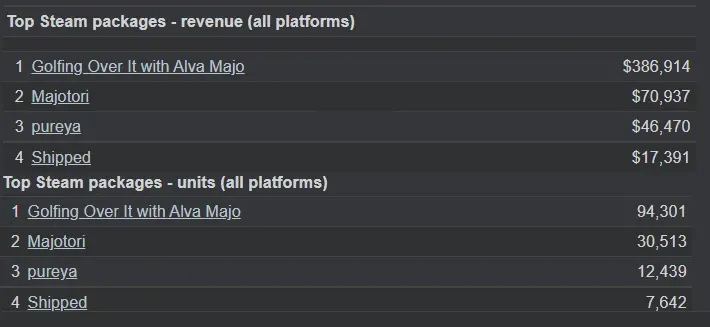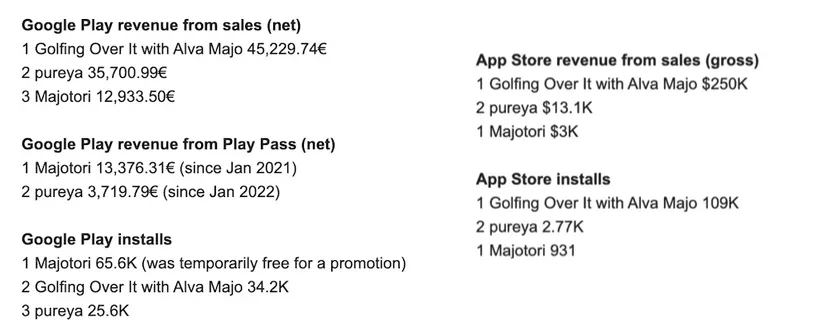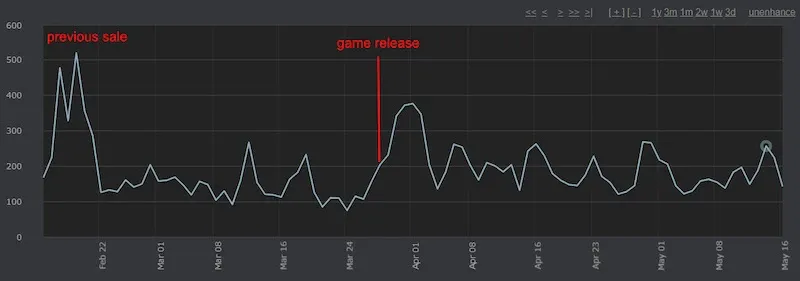
[The GameDiscoverCo game discovery newsletter is written by ‘how people find your game’ expert & company founder Simon Carless, and is a regular look at how people discover and buy video games in the 2020s.]
Well, *checks outside*, it definitely seems to be a) daylight and b) another Monday. So let’s get going with another apparently entertaining and informative GameDiscoverCo newsletter! And this one’s a particularly interesting approach to discoverability…
Interviewing Through It With Alva Majo – game dev influencer style.
So we’ve talked in the GameDiscoverCo newsletter before about popular YouTubers who also make games. (One obvious example is Dani, creator of Crab Game and Muck – but there are quite a few others.)
These devs have captured the attention of a big YouTube audience, and use it to a) understand what kind of games are enjoyed by influencers and b) show their games to their audience and get them to ‘buy in’. It’s a fascinating crossover.
Therefore, when popular Spanish language devTuber Alva Majo (376k YouTube subs) said he was open to chat, we were very intrigued. Alva is particularly known for his masocore Getting Over It with Bennett Foddy pastiche, Golfing Over It with Alva Majo (cute!)
But his team’s also made multiple other games, including arcade ‘mini-games that take 10 seconds’ title pureya, narrative quiz game Majotori, and recent free viral Steam hit ‘The one who pulls out the sword will be crowned king’ (above), which has had 270,000 downloads and counting.
Alva was kind enough to be transparent with us on how his income works out. He makes an average of 1.000€/month from YouTube and 400€/month from Twitch. And then here’s his Steam grosses to date – remember devs get 58% after gross to net calcs:

In addition, he’s also put a number of his games out on iOS and Android. And here’s the LTD stats he shared with us – decent monetization for indie premium mobile. (BTW, this is another indication that Google Play Pass can be useful extra revenue.)

So maybe these numbers aren’t earthshattering for large companies. But Alva is – by the look of it – having tonnes of fun and making a good living as an independent creator. And we love that! So here’s what we asked him about his situation:
Q: It seems like you’re a witty guy! A lot of your games are short and funny. Can you talk a little bit about the evolution of your attitude to making games in general? (I sometimes tell people not to make short or cheap games, but it’s working for you.)
As many other inexperienced developers, I originally started by trying to make my dream game, biting off way more than I could chew and getting nowhere. After that, I radically changed my approach and went for the smallest (but interesting enough to sell at a price) game I could think of. It worked for me. And since I was mostly working all by myself, I kept doing games that were within my means.
I got used to thinking only about small ideas, so I kept making them. It’s probably time to aim for something with a larger scope. But releasing a variety of games and not getting caught in endless development cycles is certainly satisfying
Q: You’re also a pretty well known dev YouTuber in Spanish language at this point – how important is that to people seeing and buying your games? (Do you have a big Spanish sales share for all games, or just a few?)
Spain and Latin America make a good share of my sales for all except Golfing Over It*. The greatest advantage of my YouTube channel is having a guaranteed push at launch, which makes it way easier for the stores’ algorithms to notice my games, and allows them to reach beyond my audience.
(*Alva showed me his Steam country breakdown for Golfing Over It, and it somewhat mirrors Getting Over It’s popularity: 35% Korea, 16% U.S., 11% China, everything else 3% or less.)
Q: Golfing Over It has done quite well as a funny pastiche of Getting Over It. But some people clearly also play it seriously – it’s not just a joke. How/why did you decide to make that?
At the time I lived near a golf course and that inspired me to think about ideas for golf-related games. The title “Golfing Over It” just popped up in my head one day and I thought “That’s brilliant! Someone should make that game!” – and that someone was me, haha. (Even though I don’t really like that kind of frustrating games.)
Of course, I was aware that the title itself served as a great hook that could make it ride off Getting Over It’s popularity. That was an enticing plus, but not the main motivator. Every other game inspired by Getting Over It I had seen was a straight cash-grabbing ripoff “bald man inside [container] pushing himself with [long item]”.
It was not my intention to be one of them; I wanted to bring something to the table. My game helped spawn a new genre of frustrating platformers – arguably a disservice to humanity, but some people really enjoy games that make them suffer (particularly South Koreans, according to my sales!)
Q: What’s the key to being a popular dev YouTuber, no matter what the language? Maybe there’s 3 or 4 things you do well…?
You need to be entertaining, which can mean a lot of things. For me, it was a mix of humor & interesting information. People see me as both their teacher and the class clown.
You want people to know about your games, but no one cares about you or your games, so a development diary is not going to cut it. You need to lure them in with an interesting topic and then bring in your personal experience. Having released a single game on Steam, I already had enough to share.
There are lots of things that look basic to me but are an enigma to people that are one step below on their developer journey – or just curious about gamedev-related topics. Things like “who decides the price/discounts of your games?” or “where do Steam keys come from?” are enough to make an interesting video. Then I will use that premise to share my personal journey, which makes people invested in me.
Honesty and transparency work wonders – and is one of the keys to my style of humor. When releasing a new game, I will say things like: “This is a great opportunity for you to put your money into my bank account”. With a good delivery, people find that kind of blunt honesty hilarious.
Sharing my flaws and making a fool out of myself makes me look more trustworthy and relatable than sharing my virtues ever would. Everything that goes wrong is a potential topic for a video, as is everything new I learn that I could teach to others. Talking about money is always an interesting topic. How much do I earn? How much does it cost for this or that? People love to know that.
Q: Can you talk about your goals with ‘The one who pulls out the sword will be crowned king’? Is it a prank, a deliberate business model boost for your paid titles through people noticing it, or what? It seems to have a very strong ‘hook’…
It’s art! I had a strong vision and I wanted to make it real, even if it was at a loss.
As the title implies, “The one who pulls out the sword will be crowned king” is a game about pulling a sword out of a stone, like in the Arthurian legend. The catch is that the sword is long and heavy, and gets longer and heavier each time someone else online pulls it out. The online features were not part of the original plan. But after I had the idea I couldn’t just not do it, even if it would cause great suffering to the most stubborn of players. (It’s like Golfing Over It all over again, haha.)
The point of the game is getting to see the ending, which is way more elaborate than the game itself and feels actually rewarding – even if the game itself felt like punishment. If dragging your mouse [around] for half an hour just to prove you can do it doesn’t sound that enticing, you can just play the offline mode and be done within 5 minutes.
As for boosting the sales of my paid titles, the graph shows some increase in the overall revenue compared to the previous month. Not enough to cover development costs, but it’s something:

Q: Do you have any advice for people who want to follow your lead and become a popular dev YouTuber/game maker all at the same time? Is it easy? Are there corpses of lots of people who tried and failed by the side of the road? 😛
I was lucky because I was one of the first. Lots of other Spanish devs tried to replicate my success and failed miserably. Growing a channel can take a lot of time.
I’ve been uploading one video every week for more than 3 years now. And making videos takes roughly half of my working time, so that’s time not invested in developing games (it’s time invested in marketing, though). Consistency helps a lot.
But even if you put in the work, there’s no guarantee that you will make it or that people will like your style. On the other hand, there’s no harm in trying, and sharing your journey can be fulfilling, even if it’s with an occasional video now and then.
Here’s some basic advice: Make your videos short and to the point, and treat them as their own product. What would be an interesting title? What kind of thumbnail would convey the content while being eye-catching? Try to think of that first, then make a video that fits, not the other way around.
[We’re GameDiscoverCo, an agency based around one simple issue: how do players find, buy and enjoy your premium PC or console game? We run the newsletter you’re reading, and provide consulting services for publishers, funds, and other smart game industry folks.]






